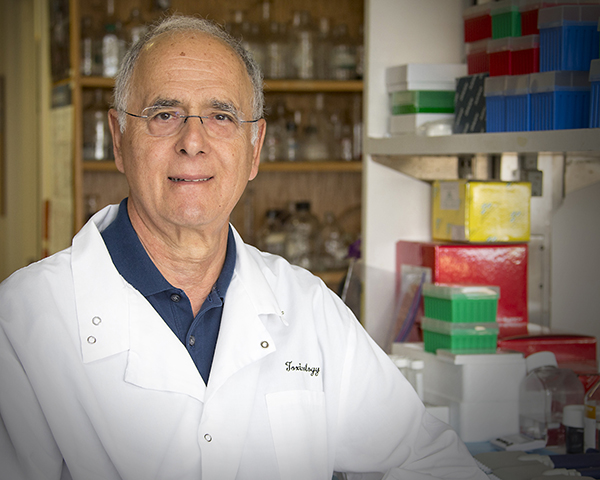Texas A&M CVM Researcher Develops Potential Therapeutic Treatment For Cancers, Endometriosis
Story by Madeline Patton, CVMBS Communications

Dr. Stephen Safe, a Distinguished Professor in the Texas A&M College of Veterinary Medicine & Biomedical Sciences’ (CVM) Department of Veterinary Physiology & Pharmacology (VTPP), has developed a family of pharmaceutical compounds (C-DIMs) that could be a potential treatment method for a variety of diseases.
Safe’s team has now established a research collaboration and licensing agreement with the Scottsdale, Arizona,-based Systems Oncology to commercially develop a series of pharmaceutical compounds based on the Texas A&M team’s work.
Safe’s lab discovered that their C-DIMs bind and inactivate a set of orphan nuclear receptors, NR4A1 and NR4A2, known to have increased activity in such conditions as breast cancer, glioblastoma, rhabdomyosarcoma, endometrial cancer, and endometriosis.
Because NR4A-nuclear receptors play a significant role in inflammation and cell division, Safe and his team have primarily focused on cancer and endometriosis models, targeting the receptor as a means for treating these diseases.
“This receptor has been identified in several laboratories and is also involved in metabolic disease, arthritis and cardiovascular disease,” Safe said. “It’s really becoming an important drug target.”
The NR4A-family of nuclear receptors have been found to activate many cellular processes related to cancer progression, such as rapid reproduction of malignant cells, inhibiting programmed cell death, and invasion. C-DIMs have the ability to eliminate those processes without affecting normal cells.
“The nuclear orphan receptor NR4A1 seems to be very pro-oncogenic; it makes cells grow and divide and invade, and it has all sorts of cancer-like properties,” Safe said. “Our compounds bind to this receptor and inactivate it, so all the pro-cancerous activity of this receptor in solid tumors is inactivated by our C-DIMs.”
The initial research on the role of C-DIM/NR4A antagonists for treating Rhabdomyosarcoma, a serious pediatric cancer, was funded by the Kleberg Foundation; this has resulted in several publications, including a paper in Cancer Research, a publication from the American Association for Cancer Research.
In addition, Safe’s studies of endometriosis in collaboration with Dr. Sang Jun Han, at Baylor College of Medicine, have found that NR4A1 levels are higher in women with the condition than those without. Endometriosis affects nearly 15 percent of women of reproductive age, but the only treatment for the condition is hormonal medications. C-DIMs could provide a non-hormonal therapy for treating this condition.
“Our drugs target this receptor,” Safe said. “In cancer, the drugs inhibit all of these oncogenic pathways, and in endometriosis, they inhibit inflammatory pathways.”
The Safe laboratory, in collaboration with CVM assistant research scientist Dr. Gus Wright, has also been developing C-DIMs as small molecule mimics of immunotherapeutics, which are a new class of drugs that have limited, but highly effective, anticancer activities.
Studies by Wright and Dr. Keshav Karki, a graduate student in the Safe laboratory, have now demonstrated that C-DIMs mimic the activities of immunotherapeutics in mouse models of breast cancer; this research—supported by the National Institutes of Health, Texas A&M AgriLife Research, and the Sid Kyle Chair Endowment—is also described in a publication that has been accepted by Cancer Research (https://cancerres.aacrjournals.org/content/early/2020/01/07/0008-5472.CAN-19-2314).
Before the treatment can be given to humans, C-DIMs must be tested and optimized for a targeted disease, which is where Systems Oncology comes in. Systems Oncology will steer the most promising C-DIM(s) through the pharmaceutical regulatory process through early-stage clinical trials and, subsequently, will form partnerships with other pharmaceutical companies to enable the clinical use of these C-DIMs in the future.
Additionally, Systems Oncology has made a commitment to sponsor further research and development activities in Safe’s lab over the next three years.
Safe believes the drugs can be used to help in the treatment of cancer, endometriosis, and potentially other disease.
“We’re pretty excited about it,” Safe said. “We’re getting more information on the drugs’ ability to treat cancer, endometriosis, and potentially other diseases, and it all looks good. We’re just hoping we can bring it forward so that C-DIMs can proceed into clinical trials and provide benefits to patients.”
###
For more information about the Texas A&M College of Veterinary Medicine & Biomedical Sciences, please visit our website at vetmed.tamu.edu or join us on Facebook, Instagram, and Twitter.
Contact Information: Jennifer Gauntt, Director of Communications, Texas A&M College of Veterinary Medicine & Biomedical Sciences; jgauntt@cvm.tamu.edu; 979-862-4216


